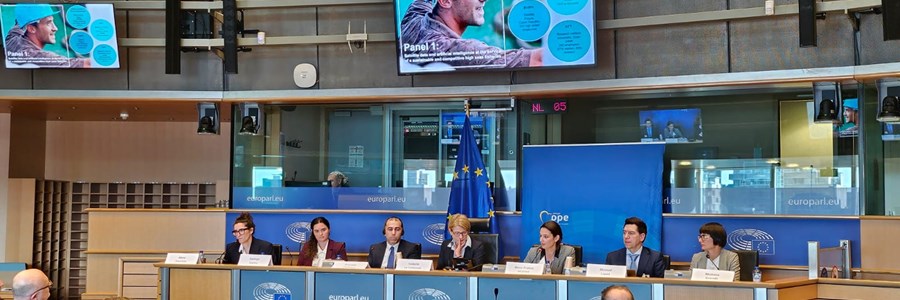Europêche spotlights fisheries Blue Tech as key to Oceans Pact

Yesterday, EPP MEP Isabelle Le Callennec, with Europêche’s collaboration, successfully hosted Competitive Blue Tech for Sustainable High Seas Fisheries at the European Parliament. Mr. Polyvios Eliofotou, member of the cabinet of Costas Kadis, Commissioner for Fisheries and Oceans, also introduced the event. Le Callennec was positive that thanks to this event, fisheries and their stakeholders were able to demonstrate their involvement in blue technological and industrial innovation at a critical moment: the EU Clean Industrial Deal is still to be shaped and the European Oceans Pact will be key in the discussions in Nice, at the 3rd United Nations Ocean Conference (9-13 June 2025).
At a time when the European Commission is developing its Future Clean Industrial Deal and Ocean Pact, the event provided key insights into how satellite data, artificial intelligence (AI), and advanced maritime equipment are transforming the management of our oceans and the fisheries sector. It also demonstrated that European fisheries drive innovation and strengthen Europe’s technological leadership, positioning fisheries as a key pillar of this Oceans Pact.
Beyond the Fleet: employment, innovation and Europe’s competitive edge
Discussions highlighted that the EU's distant water fleet accounts for 20% of the seafood landed by the EU fleet. Yet, its impact goes far beyond just the fleet—it drives industrial innovation, fosters technological advancement and supports employment across the EU and globally.
"Operating mainly in the distant waters, far from Europe, the EU long-distance fleet invests and relies on Blue Tech for efficiency, monitoring and sustainability. The companies present at this event embody the core values of the Ocean Pact" said Anne-France Mattlet, Deputy Managing Director of Europêche. "The EU fleet is not only a provider of seafood but also a catalyst for innovation and technological progress. By supporting the EU fleet, we ensure that these companies, with their cutting-edge technology and high European standards, continue to lead ocean global governance, preventing lower-standard competitors from gaining ground."
Insights from Blue Tech experts
The first panel, led by Europêche, featured key industry experts who provided real-world examples of how Blue Tech is shaping the future of sustainable high seas fisheries. Representatives from AZTI, CLS, EUSPA, and Satlink (also representing Marine Instruments and Zunibal) discussed how satellite data and AI enhance sustainability and competitiveness in the sector.
Fishing vessels rely on and are major users of the EU Space data, including Galileo and Copernicus, for navigation, security and monitoring; KSAT’s Sentinel-1 imagery to detect icebergs is an example of security tool. CLS’s CATSAT project transforms satellite data into AI-powered oceanographic maps, enabling precise tuna stock predictions and smarter, more sustainable fishing.
Echo sounder buoys from Satlink, Marine Instruments, and Zunibal act as floating data hubs, transmitting real-time GPS and biomass estimates. Data is also transmitted to regulators and scientists. The tuna research institute AZTI uses them to refine tuna stock assessments. The buoy also allows to reduce carbon footprint per ton landed while improving fleet efficiency. Contrary to misconceptions, technological advancements in Europe’s highly regulated fisheries help reduce bycatch, enhance selectivity, and promote crew well-being.
Another panel, led by SEA Europe, highlighted how distant-water fisheries drive industrial innovation. APINA’s air-freezing system ensures top-quality tuna while meeting stringent EU sanitary standards. Pontos AI optimizes vessel efficiency and lowers carbon footprints, while Thalos’ OceanBox boosts satellite connectivity for crews. Shipyards in the Basque Maritime Cluster build fishing vessels with EU design, equipment, steel work and engineering, using more than 50 suppliers, all Europeans.
A call to strengthen Europe's leadership in fisheries innovation
The discussions reaffirmed that Europe’s high-tech, high-standard fleet is a pillar of industrial innovation, competitiveness and economic strength. Without it, the technological ecosystem that relies on the fleet and drives employment, innovation and competitiveness in the global Blue Economy would be at risk, weakening the EU’s global leadership in sustainable fisheries.
As Eliofotou was affirmative that “EU has the chance to be able to find its own way and shall be proud of its blue tech companies”, SEA Europe called for a dedicated Blue Alliance to finance these advancements, emphasizing that regulatory coherence is crucial. As Europêche stressed: “Financing must align with practical, competitive, and sustainable policies and regulations driven by collaboration between Commission’s different DGs—this should be the spirit of the European Oceans Pact.”
ENDS
Press contact:
Daniel Voces, Managing Director of Europêche +32 489 26 81 07 daniel.voces@europeche.org
Anne-France Mattlet, Deputy Director of Europêche +33 678 11 63 01 anne-france.mattlet@europeche.org
Attachments:
Tags: Blue economy, tuna, Fisheries and Oceans